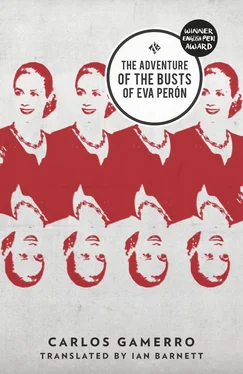Carlos Gamerro - The Adventure of the Busts of Eva Perón
Здесь есть возможность читать онлайн «Carlos Gamerro - The Adventure of the Busts of Eva Perón» весь текст электронной книги совершенно бесплатно (целиком полную версию без сокращений). В некоторых случаях можно слушать аудио, скачать через торрент в формате fb2 и присутствует краткое содержание. Год выпуска: 2015, Издательство: And Other Stories, Жанр: Современная проза, на английском языке. Описание произведения, (предисловие) а так же отзывы посетителей доступны на портале библиотеки ЛибКат.
- Название:The Adventure of the Busts of Eva Perón
- Автор:
- Издательство:And Other Stories
- Жанр:
- Год:2015
- ISBN:нет данных
- Рейтинг книги:3 / 5. Голосов: 1
-
Избранное:Добавить в избранное
- Отзывы:
-
Ваша оценка:
- 60
- 1
- 2
- 3
- 4
- 5
The Adventure of the Busts of Eva Perón: краткое содержание, описание и аннотация
Предлагаем к чтению аннотацию, описание, краткое содержание или предисловие (зависит от того, что написал сам автор книги «The Adventure of the Busts of Eva Perón»). Если вы не нашли необходимую информацию о книге — напишите в комментариях, мы постараемся отыскать её.
Carlos Gamerro's novel is a caustic and original take on Argentina's history.
The Adventure of the Busts of Eva Perón — читать онлайн бесплатно полную книгу (весь текст) целиком
Ниже представлен текст книги, разбитый по страницам. Система сохранения места последней прочитанной страницы, позволяет с удобством читать онлайн бесплатно книгу «The Adventure of the Busts of Eva Perón», без необходимости каждый раз заново искать на чём Вы остановились. Поставьте закладку, и сможете в любой момент перейти на страницу, на которой закончили чтение.
Интервал:
Закладка:
‘They say there are infiltrators in your midst… professional agitators, communists, with links to guerrilla organisations…’
Marroné took belligerent offence, slid his hand inside his overalls and pulled out the crucifix he wore round his neck.
‘You calling me a communist? What kind of communist wears a crucifix like this, pray tell? I’ll bet you and that lot that’s with you if you come in the factory and find a single brick that ain’t Peronist I’ll eat my hat.’
‘What if the management don’t give in? Are you going to stay here for ever?’
‘If they don’t back down that’s their bad luck. They’ll be left with nothing. We can run the factory on our own we can, if we puts our minds to it. We’ll show ’em they’s parasites living off the people and we’ll all be a lot better off without ’em.’
‘And what if the police try to retake the factory by force?’
‘We’ll be ready for them is what’ll happen. Bring them on if they dare. They’ll be in for a big surprise.’
The journalists’ mistake was understandable in a way: their bourgeois consciousness made it hard for them to tell a false worker from a true one. But such an explanation didn’t hold for the lady who wobbled up to him on two legs like flowerpots and handed him a trayful of empanadas, beaming at him through her remaining half-dozen teeth, ‘For you and the lads, ’andsome. Don’t let up, pet, we’re all rooting for you ’ere we are. Keep going, got ’em by the balls you ’ave, don’t let ’em off the ’ook now, that lot are more slippery than the devil himself, they’ll stick the knife in when you ain’t looking, mark my words. You just watch your backs. And make sure you get some proper food in you and a good night’s sleep… Gotta stay fit and healthy, remember, case things get heavy like. Oooooh, I can tell you a thing or two about that. My late husband, God rest his soul, was just like you lot. Always giving them gorillas some, or anyone as ’ad a bad word to say about Perón.’ And, if he was being absolutely honest with himself, these practical achievements of his filled him with satisfaction, but also with a nagging sense of unease. Were Dale Carnegie’s tips, or Marroné’s proven ductility, or his recently discovered thespian abilities enough to explain just how easy, how untraumatic his introduction to the world of the working class had proven? Or was there something else? From what he had gathered, Paddy himself had found it something of an uphill struggle, whereas he, Marroné… Because when it came to the executives and the office staff, he’d put all his efforts into fitting in, applying the rules of How to Win Friends and Influence People with equal zest, and it hadn’t gone half as well as it had with this bunch. Perhaps the gene pool really was stronger than all else, and the fact of his adoption glared bright and clear through his upbringing in the bosom of a refined Anglo-Argentine family, his St Andrew’s and Stanford education, the trips to Europe and the United States, the summers in Punta del Este; as did his hair, which, just days after escaping the hairdresser’s practised hands, would already be verging on the mane-like, advertising his plebeian Indian blood for all to see. ‘You can certainly tell you’re the son of darkies!’ His father’s words, blurted out in a fit of exasperation, rang once again in his ears, as they did every time the subject came to mind. He had apologised immediately, but the ten- or eleven-year-old Ernestito had never forgotten or forgiven, sensing in those words a verdict that would brand him for ever. The stigma of his origins had dogged him with all the tenacity of a bloodhound at school too. Marooné! Maroon Monkey! Marron Crappé! were among his classmates’ favourite insults when they ganged up on him, and thus his mixed feelings every time the strikers or slum-dwellers took him for one of them.
Another source of unease stemmed from the realisation of how little he missed home and work. True, he could use the phone as often as he liked, which he did at least once a day, to say hello to his little boy and his wife (who only through Govianus’s timely intervention had finally renounced the belief that it was all a story Marroné had concocted to cheat on her), and to ring Govianus every morning to keep abreast of the latest developments. He could have climbed into his car and driven home or to work any time he liked: he was free to come and go as he pleased. Yet, as he had told the journalist who’d interviewed him for the television, the plasterworkers’ strike was going strong across the country, and all attempts by the company to procure the busts of Eva through other channels had failed miserably. At least they had a man on the inside at Sansimón’s: he was their only hope. Whenever he could — in conversation, at daily assembly — he would bring up the possibility of breaking the basic rule of every strike and producing at least just a few ‘trial’ busts, or would try to initiate the less headstrong in the virtues of the ‘Japanese strike’, where in true samurai fashion the workforce would work twice as hard to produce an unsellable surplus. And though the motion was never passed, he found out from subsequent conversations his ideas were not falling on stony ground. But these purely practical justifications weren’t enough to hide Marroné’s undeniable reluctance to return to the routine of his work and home life. Perhaps, he told himself to appease the misgivings of his bourgeois conscience, it all boiled down to a feeling that he was on holiday, without the usual timetables and chores: the occupied plasterworks had become a proletarian version of an all-inclusive holiday camp, complete with recreation activities and games. Only the several days without a bowel movement weighed a little heavy on him — that and almost as many without sex. There were times he regretted not having taken up Dorita’s generous offer: her very lack of sex appeal could have worked — as it did with his wife — as an antidote for the malfunction in which his sexual timidity was rooted. By what sinister joke of nature, he sometimes asked himself, had his connections been switched? If his overeagerness were to move from his testicles to his intestines and their stubbornness make the reverse journey, all in his life would be well, he felt.
Meanwhile, there were crucial hours ahead, hours that could bring about that ‘17th October’ he had read about in the photonovel. Though enthusiastically supported by the workers, their families and even the local residents, the occupation had begun to go flat, leaking air through a thousand little holes. The sheer number and variety of the tasks was overwhelming, and many were already beginning to mutter that when they worked for the management they at least had a timetable and a wage. The assemblies were held daily, sometimes at the rate of two or three a day, and were packed mainly by militants from leftist groups, who spent the time discussing the Chinese or Cuban Revolutions and calling for a minute’s silence for Che Guevara or today’s daily update of murdered militants. Most of the genuine workers had families to support and many of them missed sleeping in their beds, kissing their children in the mornings and banging the missus whenever they felt like it; also, Sansimón had gradually caved in to their demands, giving them pay rises, better working conditions, full payment of overtime, and the heads of Garaguso and Cerbero; but he had baulked at their demand to reinstate all those dismissed for union or political reasons since ’55, and his outburst at their insistence (‘Fine! And would you like me to suck their dicks one by one as well?’) had rather dampened the negotiating climate.
Rumour had it that these concessions were no more than ruses — that Sansimón was only waiting for them to release him and vacate the factory before filing for bankruptcy and turfing them all out on the street — and many of them, their faith daily sapped by the sermons of Baigorria and his henchmen, had begun to believe it. Faced with this eventuality, the collaborationists were calling for the strike to be lifted before things got out of hand, the negotiators for consensus over a timetable of reinstatements, the moderates to pursue the strike but call off the occupation (which would allow them to stay at home all day watching TV, otherwise what in God’s name were they striking for?), while the hardliners — now in a distinct minority — upped the ante: if Sansimón refused to play ball, they’d get to keep the factory and he could go cry into his soup. Everything seemed to be pointing to one big assembly that would decide once and for all whether to end the occupation or continue it.
Читать дальшеИнтервал:
Закладка:
Похожие книги на «The Adventure of the Busts of Eva Perón»
Представляем Вашему вниманию похожие книги на «The Adventure of the Busts of Eva Perón» списком для выбора. Мы отобрали схожую по названию и смыслу литературу в надежде предоставить читателям больше вариантов отыскать новые, интересные, ещё непрочитанные произведения.
Обсуждение, отзывы о книге «The Adventure of the Busts of Eva Perón» и просто собственные мнения читателей. Оставьте ваши комментарии, напишите, что Вы думаете о произведении, его смысле или главных героях. Укажите что конкретно понравилось, а что нет, и почему Вы так считаете.











